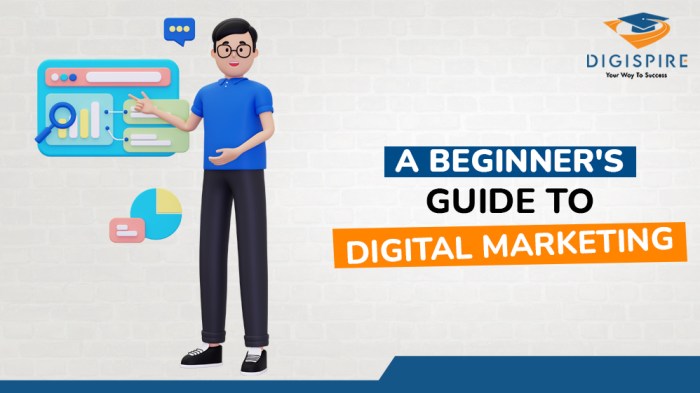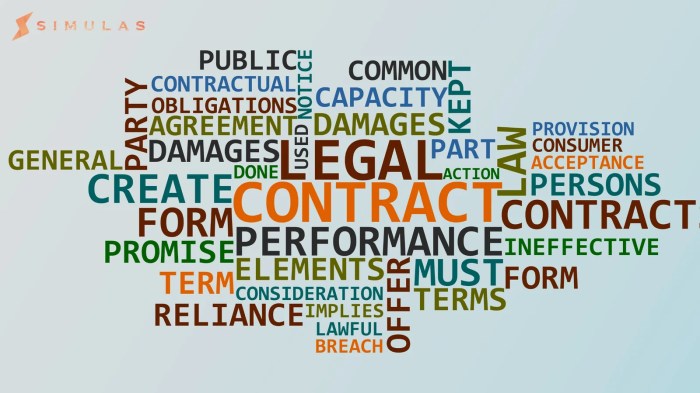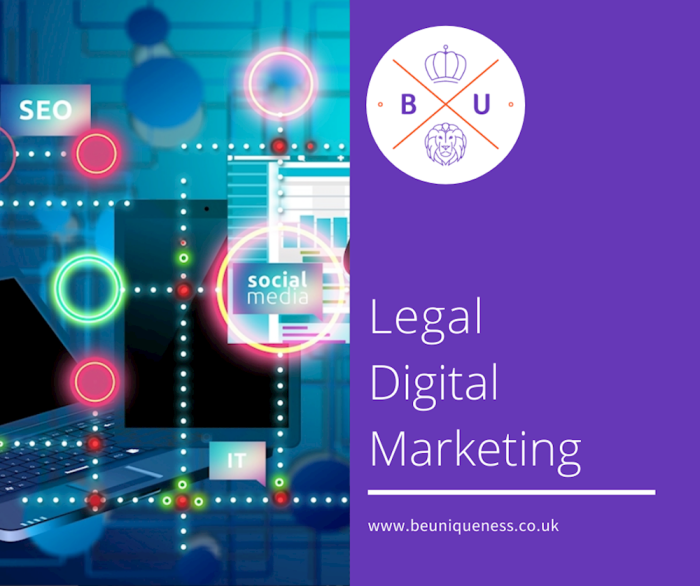Embark on a journey through the realm of Digital Marketing for Legal Professionals: A Beginner’s Guide. This introduction sets the stage for a comprehensive exploration of the topic, blending informative insights with engaging storytelling to captivate readers from the outset.
The subsequent paragraph delves into specific details, offering a clear and vivid picture of the subject matter at hand.
Introduction to Digital Marketing for Legal Professionals

In today's digital age, it is essential for legal professionals to embrace digital marketing to stay competitive and reach a wider audience. Digital marketing offers various strategies that can help law firms and individual attorneys stand out in a crowded market and attract potential clients.
Key Digital Marketing Strategies for the Legal Industry
- Search Engine Optimization (): Optimizing website content and structure to rank higher on search engine results pages, increasing visibility to potential clients.
- Content Marketing: Creating relevant and valuable content to establish expertise, build trust, and engage with the target audience.
- Social Media Marketing: Utilizing platforms like Facebook, LinkedIn, and Twitter to share updates, articles, and connect with clients.
- Pay-Per-Click Advertising: Running targeted ads on search engines and social media platforms to drive traffic and generate leads.
- Email Marketing: Sending personalized and informative emails to nurture client relationships and keep them updated on legal services.
Benefits of Utilizing Digital Marketing in the Legal Sector
- Increased Visibility: Digital marketing helps legal professionals reach a larger audience and stand out in a competitive market.
- Cost-Effective: Compared to traditional marketing methods, digital marketing offers a more cost-effective way to promote legal services and reach potential clients.
- Targeted Advertising: With digital marketing, legal professionals can target specific demographics and interests to ensure their message reaches the right audience.
- Measurable Results: Digital marketing provides analytics and data that allow legal professionals to track the performance of their campaigns and make informed decisions for future strategies.
Building an Online Presence

Establishing a strong online presence is crucial for legal professionals to reach a wider audience and showcase their expertise. This can be achieved through various strategies such as website optimization, content creation, and engaging with potential clients online.
Optimizing Your Website
Website optimization plays a key role in ensuring that your online presence is effective and user-friendly. Some important steps to optimize your website include:
- Creating a responsive and mobile-friendly design to cater to users accessing your site from different devices.
- Optimizing your site for search engines by using relevant s, meta tags, and quality content.
- Ensuring fast loading times and easy navigation to provide a seamless user experience.
Showcasing Expertise Online
There are several effective ways for legal professionals to showcase their expertise online, including:
- Writing insightful blog posts on relevant legal topics to demonstrate knowledge and attract potential clients.
- Creating informative videos or webinars to engage with audiences and provide valuable insights.
- Participating in online forums or social media platforms to share expertise and connect with peers in the industry.
Importance of Content Creation
Content creation is essential for legal professionals to establish credibility and attract clients. By creating high-quality and informative content, you can:
- Position yourself as an authority in your field and build trust with potential clients.
- Improve your search engine rankings by regularly updating your website with fresh and relevant content.
- Educate your audience on legal matters and demonstrate your expertise through thought leadership pieces.
Social Media Marketing for Legal Professionals
Social media plays a crucial role in the digital marketing strategy for legal professionals. It provides a platform to engage with clients, build credibility, and showcase expertise in a more personalized way compared to traditional marketing methods.
Comparison of Different Social Media Platforms
- LinkedIn: Ideal for professional networking, sharing industry insights, and connecting with potential clients in the business and legal sectors.
- Twitter: Great for quick updates, sharing legal news, and engaging in conversations with a broader audience.
- Facebook: Useful for building a community, sharing educational content, and running targeted ad campaigns to reach specific demographics.
- Instagram: Visual platform perfect for showcasing office culture, behind-the-scenes insights, and humanizing the legal practice.
Tips for Engaging with Clients and Building Credibility
- Consistent Posting: Regularly share valuable content to stay top of mind with your audience.
- Interact with Followers: Respond to comments, messages, and engage in conversations to show a human side to your practice.
- Showcase Expertise: Share case studies, legal tips, and success stories to establish credibility and expertise in your field.
- Use Visuals: Incorporate images, infographics, and videos to make your content more engaging and shareable.
- Collaborate with Influencers: Partner with industry influencers or thought leaders to expand your reach and credibility within the legal community.
Content Marketing Strategies
Content marketing plays a crucial role in helping legal professionals establish credibility, attract clients, and build a strong online presence. By creating valuable and informative content, legal professionals can showcase their expertise and knowledge in their respective fields. This not only helps in engaging with potential clients but also sets them apart as thought leaders in the industry.
Designing a Content Marketing Plan for the Legal Industry
Creating a successful content marketing plan for legal professionals involves understanding the target audience, setting clear goals, and choosing the right platforms to distribute content. Here are some key steps to tailor a content marketing plan for the legal industry:
- Identify the target audience: Understand the demographics, interests, and pain points of your target clients to create content that resonates with them.
- Set clear objectives: Define what you want to achieve with your content marketing efforts, whether it's generating leads, increasing brand awareness, or educating clients.
- Choose the right channels: Select the platforms where your target audience spends their time, such as legal websites, social media, or industry-specific forums.
- Create a content calendar: Plan your content creation and distribution schedule to ensure consistency and relevance.
- Measure and analyze results: Track the performance of your content using metrics like website traffic, engagement rates, and conversion rates to refine your strategy.
Engaging Content Ideas for Legal Professionals
To stand out in a competitive market, legal professionals can create various types of engaging content that showcase their expertise and provide value to their audience. Some examples of content ideas include:
- Blog posts on legal topics: Share insights, case studies, and updates on relevant legal issues to position yourself as a trusted source of information.
- Infographics explaining complex legal concepts: Break down complicated legal jargon into easy-to-understand visuals to educate and engage your audience.
- Video tutorials on legal processes: Create step-by-step guides or tutorials to help clients navigate legal procedures and understand their rights.
- Podcasts featuring legal experts: Host interviews with industry professionals, discuss hot topics, and provide valuable insights through audio content.
- Ebooks or whitepapers on industry trends: Offer in-depth resources on emerging legal trends, regulations, or best practices to establish authority in your field.
Search Engine Optimization () for Legal Professionals

is crucial for legal professionals looking to enhance their online visibility and attract potential clients. By optimizing their websites and content for search engines, legal professionals can improve their rankings on search engine results pages (SERPs) and reach a wider audience.
Key Tactics for Legal Professionals
- Research: Conduct thorough research to identify relevant terms and phrases that potential clients may use to search for legal services.
- On-Page Optimization: Optimize webpage titles, meta descriptions, headings, and content with targeted s to improve search engine visibility.
- Quality Content: Create high-quality, informative content that addresses common legal questions and concerns to attract and engage visitors.
- Mobile Optimization: Ensure that your website is mobile-friendly to provide a seamless user experience and improve search rankings.
- Local : Claim your Google My Business listing and optimize it with accurate contact information and reviews to boost local search visibility.
Website Optimization for Search Engines
- Optimize Page Speed: Improve website loading times to enhance user experience and meet search engine requirements for fast-loading websites.
- Meta Tags: Use relevant s in meta titles and descriptions to help search engines understand the content of your web pages.
- Internal Linking: Create a logical internal linking structure to help search engines navigate your website and discover relevant content.
- Schema Markup: Implement schema markup to provide search engines with additional context about your content, such as reviews, ratings, and contact information.
- Regular Updates: Keep your website updated with fresh content, blog posts, and news to show search engines that your site is active and relevant.
Email Marketing Campaigns
Email marketing plays a crucial role in the digital marketing strategy for legal professionals. It is an effective way to communicate with clients, build relationships, and drive conversions. Here are some best practices for creating effective email campaigns and strategies to grow and engage with an email subscriber list.
Best Practices for Creating Effective Email Campaigns
- Personalize your emails to make them more relevant to the recipient.
- Segment your email list based on client preferences and behavior for targeted messaging.
- Create engaging subject lines that entice recipients to open the email.
- Include a clear call-to-action (CTA) to guide recipients on the next steps to take.
- Optimize your emails for mobile devices to ensure they are easily readable on smartphones and tablets.
Strategies to Grow and Engage with an Email Subscriber List
- Provide valuable content in your emails to keep subscribers engaged and interested.
- Offer incentives such as exclusive discounts or access to webinars for subscribing to your email list.
- Promote your email newsletter on your website and social media channels to attract new subscribers.
- Regularly clean your email list by removing inactive subscribers to improve deliverability and engagement rates.
- Analyze email performance metrics such as open rates, click-through rates, and conversions to optimize future campaigns.
Final Review
Concluding our discussion on Digital Marketing for Legal Professionals: A Beginner’s Guide, this final paragraph encapsulates key takeaways in a compelling manner, leaving readers inspired and informed.
FAQ Corner
What are some common digital marketing strategies for legal professionals??
Common strategies include content marketing, optimization, social media engagement, and email campaigns tailored to the legal industry.
How can legal professionals effectively showcase their expertise online??
Legal professionals can showcase expertise through blog posts, case studies, whitepapers, and educational webinars that highlight their knowledge and experience.
Why is important for legal professionals??
helps legal professionals increase online visibility, attract more clients, and establish credibility in a competitive digital landscape.
What are some best practices for email marketing campaigns in the legal industry??
Best practices include personalized content, clear CTAs, segmentation based on client needs, and regular engagement to nurture client relationships.






